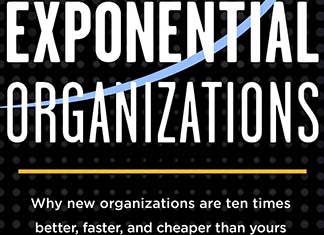Salim Ismail – Exponential Organizations: Why new organizations are ten times better, faster, cheaper than yours (and what to do about it) is the first of 3 books I’ve read recently, all stemming from Singularity University, and was full of big thinking around what exponential organisations are and case studies of how some were formed, how they scaled and problems that they went on to solve.
I don’t have an MBA in business, I’m a computer nerd who’s worked with successful startups and large enterprise companies, so I still have a lot to learn and this book filled a few gaps with solid explanations. e.g. obviously I’ve been exposed to the waterfall model of software development (since 1997..) but wasn’t aware of the formal New Product Development process, or NPD, which includes the following steps:
- Idea generation
- Idea screening
- Concept development and testing
- Business analysis
- Beta and market testing
- Technical implementation
- Commercialisation
- New product pricing
Whilst basically being the waterfall approach I learned a long time ago, it’s nice to experience formalised positive reinforcement and see it written down and discussed in an interesting manner.
Entrepreneurial success rarely comes from the idea. Instead, it comes from the founding team’s never-say-due attitude and relentless execution. Those who really want something will find options.
One of the biggest takeaways from the book covered something I’ve always been curious about for a while, how to build business models around products that are given away for free. I registered https://www.idimmu.net November 2005 and every time I had to use the Internet to solve a work related problem, I blogged about it. Over the years I engaged with other Linux bloggers and we all faced a similar problem, how to monetise a blog based around freely available information? Everyone in the industry who is good is self taught based on other people’s blogs and white papers, you don’t generally want to hire someone with an RHCE.. This book covers how to build an exponential organisation around free information.
- Immediacy: Immediacy is the reason people order in advance on Amazon or attend the theatre on opening night. Being the first to know about or experience something has intrinsic cultural, social and even commercial value. In short: time confers privilege.
- Personalisation: Having a product or service customised just for you not only gives added value in terms of quality of experience and ease-of-use or functionality, it also creates “stickiness”, as both parties are invested in the process.
- Interpretation: Even if the product or service is free, there is still considerable added value to any service that can help shorten the learning curve to using it.
- Authenticity: Added value comes from a guarantee that the product or service is real and safe.
- Accessibility: Ownership requires management and maintenance. In an era where we own hundreds of apps on several platforms, any service that helps us organise everything and improve our ability to find what we need quickly is of particular value.
- Embodiment: Digital information has no “body”, no physical form, until we give it one – high definition, 3D, a movie screen, a smartphone. In 1997 I paid for RedHat CDs even though it was free to download as it was more convenient than my 33.6kbps modem 😉
- Patronage: Some fans want to pay and will if given an easy way to do so and the amount is reasonable. I personally will buy limited edition vinyl of an album if I love it, despite services like Youtube or Spotify offering virtual, and often cheaper, alternatives.
- Findability: Creative works have no value if no one can access them, so putting yourself out there on effective channels and digital platforms so your great content can be found has considerable value in itself. Some of the amazing photographers in Asia who just use Facebook for marketing need to understand this as it took me 9 months to find them and that was only through word of mouth.
I find blogging about books I have read helps the reflection and understanding, and if I could sit here listing all the takeaways I got from Exponential Organizations I’d just end up writing another book.

